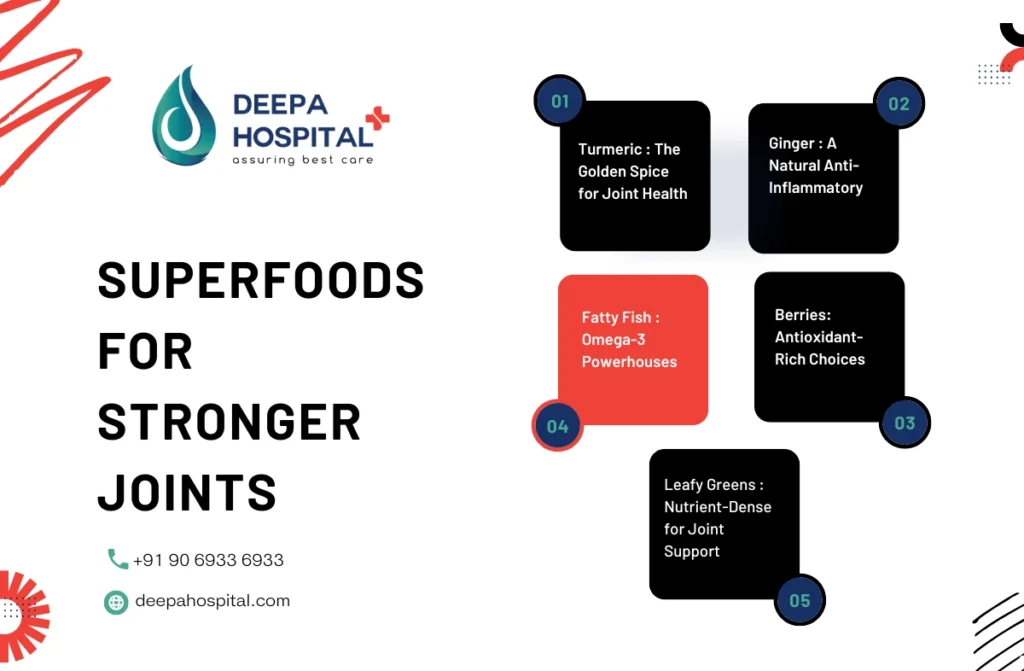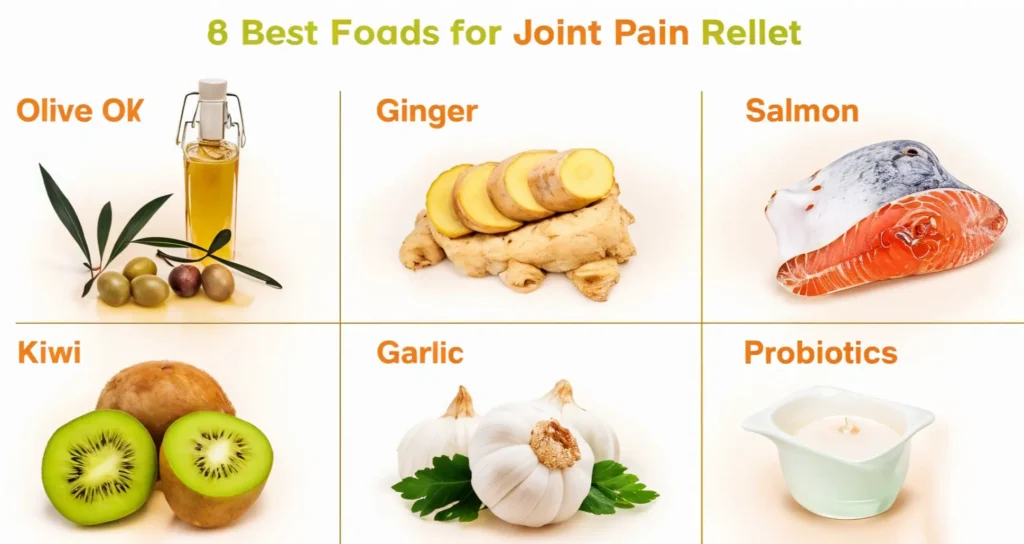Maintaining joint health is crucial for overall mobility and well-being. One effective way to support your joints is through your diet. The best foods for joint health are rich in anti-inflammatory properties and nutrients that strengthen bones and connective tissues. Deepa Hospital emphasizes the importance of a balanced diet in managing joint pain and improving function.
Incorporating specific foods can help reduce inflammation and support joint function, enabling you to lead a more active life. In this blog, we will explore the best foods for joint health and how they can contribute to better joint health.
9 Best Foods for Joint Health
Including the best foods for joint health in your diet can provide the necessary nutrients for stronger bones and joints. Here are some good food for bones and joints that you can easily incorporate into your meals:
Seeds and Nuts
Seeds and nuts are packed with healthy fats, antioxidants, and minerals that support joint health. Almonds, walnuts, chia seeds, and flaxseeds are excellent choices. They contain omega-3 fatty acids, which help reduce inflammation and improve joint function. Additionally, nuts and seeds are rich in magnesium, calcium, and vitamin E, which are essential for bone health. Snacking on a handful of mixed nuts or adding seeds to your smoothies or salads can enhance your overall nutrient intake. These foods are not only nutritious but also versatile and delicious.
Coldwater Fish
Coldwater fish, such as salmon, mackerel, and sardines, are among the best foods for joint health due to their high omega-3 fatty acid content. Omega-3s are known for their anti-inflammatory properties, which can help alleviate joint pain and stiffness. Regular consumption of coldwater fish can contribute to improved joint function and overall health. Aim for at least two servings of fatty fish per week to reap the benefits. Additionally, these fish are rich in vitamin D, which plays a crucial role in calcium absorption and bone health.
Fruit
Fruits are not only delicious but also loaded with antioxidants, vitamins, and minerals that benefit joint health. Berries, cherries, oranges, and apples are particularly beneficial. Berries are rich in antioxidants called anthocyanins, which help reduce inflammation. Cherries have been shown to lower uric acid levels, which can prevent gout attacks. Including a variety of colorful fruits in your diet ensures that you get a range of nutrients that contribute to best foods for healthy joints. Enjoy fruits as snacks, in smoothies, or as part of a balanced meal.
Cruciferous Veggies
Cruciferous vegetables, such as broccoli, cauliflower, and Brussels sprouts, are known for their health benefits, including joint support. They contain sulforaphane, a compound that may help reduce inflammation and prevent cartilage damage. Incorporating these veggies into your meals can enhance your intake of vitamins C and K, both essential for bone health. Whether steamed, roasted, or added to stir-fries, these veggies are versatile and can easily fit into your diet.
Beans and Lentils
Beans and lentils are excellent sources of protein and fiber that are beneficial for joint health. They contain essential nutrients like magnesium and potassium, which support bone health. Additionally, beans and lentils are low in fat and high in antioxidants, making them a great choice for reducing inflammation. Incorporate black beans, kidney beans, or lentils into salads, soups, or stews for a nutritious boost. These foods are not only affordable but also satisfying and easy to prepare.
Olive Oil
Olive oil, especially extra virgin olive oil, is a staple in the Mediterranean diet and is one of the best foods for joint health. It contains oleocanthal, a compound with anti-inflammatory properties similar to those found in ibuprofen. Using olive oil in cooking or as a dressing for salads can help reduce inflammation and support joint health. It’s also rich in healthy monounsaturated fats, which promote heart health. Aim to replace other oils with olive oil for added benefits.
Whole Grains
Whole grains, such as brown rice, quinoa, and oats, are essential for maintaining overall health, including joint health. They provide fiber, which helps reduce inflammation and supports a healthy weight, thereby reducing stress on your joints. Whole grains also contain essential nutrients like magnesium and selenium, which play a role in bone health. Make the switch from refined grains to whole grains for better health benefits. Enjoy whole grains in salads, bowls, or as side dishes.
Root Veggies and Garlic
Root vegetables, such as sweet potatoes and carrots, along with garlic, are among the foods to reduce joint pain. Sweet potatoes are high in vitamins A and C, which are important for immune function and inflammation reduction. Garlic contains compounds that may help combat inflammation and support joint health. Including these foods in your diet can provide a tasty way to enhance your meals while benefiting your joints. Try roasting root veggies or adding garlic to soups and stir-fries.
Dark Chocolate
Dark chocolate, particularly varieties with high cocoa content (70% or higher), is rich in antioxidants that can help reduce inflammation. It contains flavonoids, which may improve circulation and support joint health. While it should be consumed in moderation, dark chocolate can be a delightful treat that offers health benefits. Enjoy it as a small dessert or in baked goods to add a nutritious twist to your diet.

Inflammatory Foods to Avoid
To maintain optimal joint health, it’s essential to avoid certain inflammatory foods that can worsen joint pain. Here are some good food for bones and joints to steer clear of:
- Processed Sugars: High sugar intake can lead to increased inflammation and worsen joint pain.
- Trans Fats: Found in many processed foods and fried items, trans fats can trigger inflammation.
- Refined Carbohydrates: Foods like white bread and pastries can cause spikes in blood sugar, leading to inflammation.
- Excessive Salt: High sodium intake can lead to water retention and increase blood pressure, which may affect joint health.
- Red and Processed Meats: These can promote inflammation and are best limited in your diet.
- Dairy Products: Some individuals may find dairy aggravates their joint pain, particularly if they are lactose intolerant.
Avoiding these foods can help you maintain a healthier lifestyle and potentially reduce joint discomfort.
What Makes a Food Good for Your Joints?
When considering the best foods for healthy joints, it’s important to look for foods that provide essential nutrients that support joint function and reduce inflammation. Here are some key factors to consider:
- Anti-Inflammatory Properties: Foods rich in omega-3 fatty acids, antioxidants, and phytonutrients help combat inflammation.
- Nutrient Density: Foods high in vitamins and minerals, like calcium and vitamin D, support bone strength and joint health.
- Healthy Fats: Incorporating healthy fats from sources like nuts and olive oil can promote better joint function.
- Fiber Content: High-fiber foods help reduce inflammation and support weight management, which is vital for joint health.
Incorporating these foods into your diet and a regular exercise can significantly improve joint health and overall well-being.
Importance of Bone Health
Bone health is essential for maintaining mobility, strength, and overall quality of life. Strong bones support our bodies, protect organs, and facilitate movement. Bone health can diminish with age, hormonal changes, and lifestyle factors, leading to conditions such as osteoporosis and arthritis. Proper bone care through diet and lifestyle choices can help prevent such issues. Maintaining healthy bones is crucial for reducing the risk of fractures and joint pain. It’s important to incorporate good food for bones and joints, including foods rich in calcium, vitamin D, and other nutrients that promote bone density. By focusing on bone health, individuals can ensure better mobility and flexibility throughout their lives.
Key benefits of good bone health:
- Reduces the risk of fractures and osteoporosis
- Supports joint function and mobility
- Prevents chronic conditions like arthritis
- Improves posture and balance
- Enhances overall physical performance
Foods to Avoid for Better Bone Health
Certain foods can have a negative impact on bone health by contributing to inflammation, calcium loss, or hindering the absorption of essential nutrients. Reducing these foods in your diet is important for preserving bone strength and minimizing joint pain. One example is high-sodium foods, which can lead to calcium loss, weakening bones. Additionally, excessive alcohol and caffeine intake can interfere with calcium absorption and increase the risk of osteoporosis. These foods can also contribute to inflammation, which can exacerbate joint pain. Avoiding or limiting these items is an essential part of a bone-friendly diet.
Foods to avoid for stronger bones:
- High-sodium foods (processed foods, canned soups)
- Excessive caffeine (coffee, energy drinks)
- Sugary snacks and sodas (they can increase calcium loss)
- Alcohol (impairs calcium absorption)
- Red and processed meats (can increase inflammation)
Additionally, consuming too much of these foods can lead to inflammation, worsening joint pain, so focusing on the right nutrition is key to foods to reduce joint pain.
Mediterranean Diet
The Mediterranean diet is known for its numerous health benefits, including supporting bone and joint health. This diet primarily consists of fresh fruits, vegetables, whole grains, nuts, seeds, and healthy fats like olive oil. It also includes lean proteins such as fish and poultry while limiting red meat and processed foods.
Key benefits of the Mediterranean diet for bone and joint health:
- Rich in Omega-3 Fatty Acids – Found in fish, these help reduce inflammation in joints.
- High in Calcium and Vitamin D – Dairy products, leafy greens, and fortified foods strengthen bones.
- Packed with Antioxidants – Fruits and vegetables help combat oxidative stress that can damage joints.
- Good Food for Bones and Joints – Nuts, seeds, and legumes provide essential nutrients to support joint flexibility and bone strength.
By following a Mediterranean diet, individuals can manage joint pain and maintain overall bone health naturally.

Our Orthopaedic Doctors Can Help You Reduce Joint Pain
At Deepa Hospital, our experienced orthopaedic doctors provide specialized care to help patients manage joint pain effectively. Joint pain can result from conditions like arthritis, osteoporosis, or injuries, and proper treatment is essential to maintain mobility and quality of life.
How Deepa Hospital can help:
- Comprehensive Diagnosis – Our specialists conduct detailed evaluations to determine the root cause of joint pain.
- Personalized Treatment Plans – We offer tailored solutions, including medications, physiotherapy, and lifestyle modifications.
- Nutritional Guidance – We recommend good food for bones and joints, such as dairy products, leafy greens, and omega-3-rich foods.
- Advanced Treatment Options – From minimally invasive procedures to joint replacement surgeries, we provide cutting-edge treatments.
By seeking expert care at Deepa Hospital, patients can effectively manage joint pain and improve their overall bone health.
Conclusion
In conclusion, focusing on the best foods for joint health can greatly enhance your quality of life. By incorporating nutrient-rich foods like seeds, nuts, coldwater fish, and whole grains, you can support your joints and reduce inflammation. Additionally, avoiding inflammatory foods is crucial for maintaining optimal joint function.
Deepa Hospital encourages a holistic approach to health, emphasizing the role of nutrition in managing joint pain and improving mobility. Remember that a balanced diet is key to achieving the best results for your joint health. Implement these dietary changes and consider consulting with a healthcare professional for personalized advice, including foods to reduce joint pain in your daily meals.
Read Also: Best Orthopedic Hospitals in Chennai

